Content warning: The following text describes assault and can be disturbing and/or triggering for some readers. Please find resources listed at the bottom of the article.
The phrase “separate the art from the artist” exists for a reason, but is it truly possible to do that? When I think of Chris Brown, I can’t just think of him as an R&B artist—all I see is an abuser. And I’m not the only one.
On Feb. 16, Chloe Bailey announced the title of her latest single “How Does It Feel” as a part of her upcoming debut solo album In Pieces. The twist? Bailey revealed that she would be collaborating with Brown for the single, and people were immensely disappointed. Because of Brown’s history of abuse, Bailey met immediate backlash after the announcement.
Penn alum Ernest Owens tweeted, “Plenty to choose from other than Chris Brown” and proceeded to list fourteen other male R&B artists that would have been better replacements. In another tweet, Owens said, “We’re failing Black women in music if they feel like they have to collaborate with a known abuser in order to chart.”
Brown is notorious for his assault of Rihanna. Her injuries were so severe that she was hospitalized, and the haunting image of her bruised face spread like wildfire across the internet; she later sued Brown for the assault. Brown was charged with two felonies—one for attempting to throw Rihanna out of his car, and one for hitting her head against the passenger window. He was sentenced to five years of probation, one year of domestic violence counseling, and six months of community service.
However, his history of abuse did not end there. Brown spent 36 hours in jail for felony assault in 2013 and had a restraining order filed against him by ex–girlfriend Karrueche Tran in 2017. Tran reported that Brown attacked her while they were together, punching her in the stomach and pushing her down the stairs, and repeatedly threatened to kill her after they broke up. And again in 2022, just last year, Brown was sued by a woman who claimed that he drugged and raped her.
Unfortunately, this clearly has not deterred artists from collaborating with him. Many artists expressed their support for Chris Brown in recent years, including Lizzo and Kelly Rowland, to name a few. Lizzo called Brown her “favorite person in the whole fucking world,” while Kelly Rowland said that everyone deserves grace as a response to whether she believes that Chris Brown needs to be forgiven. These artists faced similar backlash to what Bailey recently experienced for publicly endorsing Brown.
But despite all the hate that he so justly receives, Chris Brown remains ever so popular. Brown’s 2023 “Under The Influence” UK Tour sold out within minutes. Brown even added several more dates to his tour due to its high demand, turning the original 13–night tour into a 26–night tour.
Many fans of Brown also took to defend him under Bailey’s “How Does It Feel” announcement. One tweeted, “Hold [Brown] by his sins like the perfectionists that you are. While you’re at it, I hope y’all heal from the hate.” Brown even responded to the backlash himself through an Instagram story, writing, “If y’all still hate me for a mistake I made as a 17–year–old, please kiss my whole entire ass! I’m fucking 33! I’m so tired of y’all running with this narrative.”
The hatred against Brown is not solely due to his assault on Rihanna. His violent tendencies did not end that night in 2009—Brown did not make just one “mistake” at 17 years old. Brown’s response just shows that he lacks remorse over his wrongdoings and refuses to even acknowledge them.
If you decide to listen to “How Does It Feel,” which released Feb. 24, take into consideration Chris Brown’s actions and response to them, or rather lack thereof. Think about whether he is the type of person that deserves your support. Not just him, but any artist you listen to.
Deborah Vagins, President and CEO of the National Network to End Domestic Violence, said, “An abusive person is the only person responsible for their actions. […] But […] we can choose how we respond to them and decide whether they reflect the kind of public figure we want to support with our time, energy, and money.”
So, while artists and fans may choose to separate the art from the artist, decide for yourself whether you really want to.
Campus Resources:
The HELP Line: 215-898-HELP: A 24–hour–a–day phone number for members of the Penn community who seek help in navigating Penn's resources for health and wellness.
Counseling and Psychological Services: 215-898-7021 (active 24/7): The counseling center for the University of Pennsylvania.
Student Health Service: 215-746-3535: Student Health Service can provide medical evaluations and treatment to victims/survivors of sexual and relationship violence regardless of whether they make a report or seek additional resources. Both male and female providers can perform examinations, discuss testing and treatment of sexually transmissible infections, provide emergency contraception if necessary, and arrange for referrals and follow up.
Reach–A–Peer Hotline: 215-573-2727 (every day from 9 pm to 1 am), A peer hotline to provide peer support, information, and referrals to Penn students.
Penn Violence Prevention: 3535 Market Street, Mezzanine Level (Office Hours: 9 am – 5 pm Monday-Friday), 12-5pm Wednesdays & 12-5pm Fridays located in Penn Women’s Center (3643 Locust Walk), Read the Penn Violence Prevention resource guide.
Sexual Trauma Treatment Outreach and Prevention Team: A multidisciplinary team at CAPS dedicated to supporting students who have experienced sexual trauma.
Public Safety Special Services: Trained personnel offer crisis intervention, accompaniment to legal and medical proceedings, options counseling and advocacy, and linkages to other community resources.
Penn Women's Center: 3643 Locust Walk (Office Hours 9:30 am – 5:30 pm Monday–Thursday, 9:30 am – 5 pm Friday), pwc@pbox.upenn.edu. PWC provides confidential crisis and options counseling.

